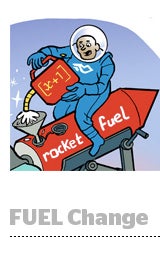 When Rocket Fuel’s interim CEO, Monte Zweben, took to the company’s first-quarter earnings call Wednesday, he was representing a significantly different company from the one that delivered lousy news to Wall Street three short months ago.
When Rocket Fuel’s interim CEO, Monte Zweben, took to the company’s first-quarter earnings call Wednesday, he was representing a significantly different company from the one that delivered lousy news to Wall Street three short months ago.
“We are a new Rocket Fuel,” Zweben said. That newness manifests not only in the company’s cost controls, including a string of C-level departures and the layoffs of 129 staffers meant to create $30 million in savings this year, but also in a shift to enterprise sales of its demand-side and data-management platform tools.
Rocket Fuel offers “managed services as we’ve always had, and now a technology platform with greater transparency for those who’d like to self-serve,” Zweben said.
Swapping media sales for technology sales is more easily said than done, but Rocket Fuel has gained some traction. In the first quarter, its ratio of revenue from direct advertisers vs. agency customers was 1-to-3. (The split was 24% to 76%.) That’s a considerable shift from one year ago, when 9% of revenue came from direct advertiser relationships. Much but not all of that increase came from the acquisition of [x+1].
But the pivot clearly ain’t over yet, and may never be.
“The shorter-term, insertion order-focused nature of Rocket Fuel’s business has made forecasting difficult,” Zweben said, adding he doesn’t believe insertion orders will ever completely go away. “Our plan is to leverage the strength of our pure media sellers and augment that with software sellers.”
To the financials: Rocket Fuel reported Q1 revenue growth of 40% and a smaller-than-expected EBIDTA loss. Of the company’s $104.3 million in gross revenues, just shy of 40% ($37.4 million) came from the all-important social, video and mobile channels. Mobile alone was 25%.
Non-GAAP net revenue of $58.8 million grew 32% compared to $44.7 million in the year-ago period, suggesting the company’s margins – which once hovered in the high-60% range – have fallen from their highs of about a year ago. More in the earnings release.
Rocket Fuel’s stock was down 2.3% in after-hours trading.
Somewhat paradoxically, management heralded inroads with agencies even as it touted its direct relationships with advertisers. These deals consisted of long-term negotiated contracts at the holding company level or with agency trading desks. Rocket Fuel claims to have comprehensive deals signed with two of the top six global trading desks.
Skeptical investment analysts on the earnings call peppered management with questions about how exactly it planned to gain inroads with the agency crowd.
In response to another question about whether Rocket Fuel’s software can effectively compete in a marketplace saturated with DMPs, Zweben acknowledged, “There are a number of other DMP products, some of them at much larger companies than us.”
But he said those companies – Oracle, Neustar and Adobe, among others – are geared toward the use of first-party data, whereas Rocket Fuel shines when it comes to applying anonymous audience segments to reach prospects in paid media.











